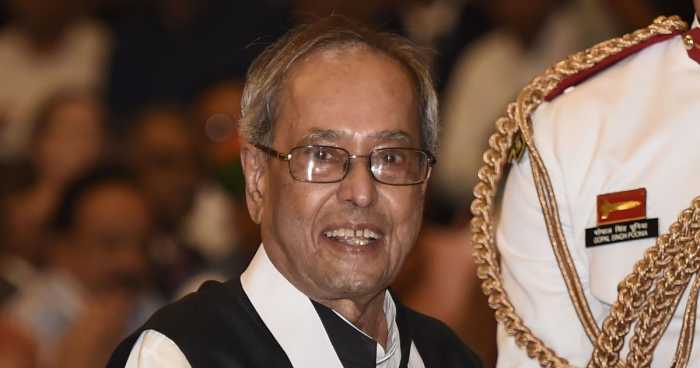
TIMELINE:
• Born on December 11, 1935, in a Bengali family in Mirati, a village in Birbhum district in West Bengal.
• Mukherjee’s father was a Congress leader who endured great hardship including being sent to jail several times for his role in India’s struggle for independence.
• He is popularly known as ‘Pranab Da’,
• Mukherjee was married to late Suvra Mukherjee, an accomplished singer of Rabindra Sangeet and an artist. He has two sons and a daughter.
• Mukherjee acquired a Master’s degree in History and Political Science as well as a degree in Law from the University of Kolkata.
• He then embarked on his professional life as a college teacher and journalist.
• Inspired by his father’s contribution to the national movement, Mukherjee in 1969 plunged into full time public life.
• Mukherjee got his break in politics in 1969 when the then-Prime Minister Indira Gandhi helped him get elected to the Rajya Sabha, the upper house of Parliament of India, on a Congress ticket.
• The many awards and honours conferred on him include highest civilian honour Bharat Ratna in 2019 by President Ram Nath Kovind, India’s second highest civilian award, Padma Vibhusan in 2008, the Best Parliamentarian Award in 1997 and Best Administrator in India Award in 2011.
• After receiving the Bharat Ratna he had expressed his gratitude on being conferred with the Bharat Ratna saying “I’ve received much more from the people and from this country than I have given to it”.
• He served India’s 13th President from 2012-2017, but prior to his election to , Mukherjee also served as the Union Finance Minister from 2009 to 2012.
• Mukherjee’s life-long political career spanned about five decades, during which he held various key posts in the Congress as well as in the governments led by Indira Gandhi, Rajiv Gandhi, P V Narasimha Rao and Manmohan Singh.
• The Rajiv-era was probably the most difficult years for Pranab Da when he was marginalised in the party, lost his Cabinet berth and was sent to Calcutta to take over the Pradesh Congress Committee.
• Later he formed his own party, the Rashtriya Samajwadi Congress, which merged with the Congress in 1989 after reaching a consensus with Rajiv Gandhi.
• He was made Deputy Minister, Industry; Shipping and Transport, Steel and Industry and Minister of State for Finance in the period 1973-74 in Indira Gandhi Government.
• He assumed office as Finance Minister of India for the first time in 1982 in the Cabinet of Prime Minister Indira Gandhi and was Leader of the House in the Upper House of Parliament (Rajya Sabha) from 1980 to 1985.
• Later , he was Deputy Chairman of the Planning Commission from 1991 to 1996, Minister for Commerce from 1993 to 1995, Minister of External Affairs from 1995 to 1996 in PV Narsimha Rao Government.
• Minister of Defence from 2004 to 2006 and once again the Minister of External Affairs from 2006 to 2009 in Manmohan Singh Government.
• He was the Minister of Finance from 2009 to 2012 and Leader of the Lower House of Parliament from 2004 to 2012 till he resigned to contest election to the office of the President.
• Mukherjee has extensive diplomatic experience and has served on the Board of Governors of the IMF, World Bank, Asian Development Bank and African Development Bank. He has led the Indian delegations to the Commonwealth Finance Ministers’ Conferences in 1982, 1983 and 1984; the United Nations General Assembly in 1994, 1995, 2005 and 2006, the Conference of Commonwealth Heads of Government at Auckland in 1995, the Non-Aligned Foreign Minister’s Conference at Cartagena in 1995 and the Conference to mark the 40th anniversary of the Afro – Asian Conference in Bandung in 1995.
• During the period 2004-2012, Mukherjee was instrumental in spearheading critical decisions of the Government on a range of issues such as Administrative reforms, Right to Information, Right to Employment, Food Security, Energy Security, Information Technology and telecommunication, setting up of UIDAI, Metro Rail etc. through Chairmanship of over 95 Groups of Ministers constituted for the purpose. • In seventies and eighties, he was instrumental in setting up the Regional Rural Banks (1975) and the EXIM Bank of India as well as National Bank for Agriculture and Rural Development (1981- 82).
• Mukherjee was also author of a modified formula for resource sharing between the Centre and the States in 1991 which came to be known as the Gadgil – Mukherjee formula.
• In 1982 as Finance Minister, Mukherjee signed the letter appointing Manmohan Singh as 15th Governor of the Reserve Bank of India.
• A prolific reader, Mukherjee has authored several books on the Indian Economy and on Nation Building.
• He resigned from the Congress Party prior to contesting to the office of President of India on 25th June 2012.
• In June 2018 Mukherjee became first former President of India to address a Rashtriya Swayamsevak Sangh (RSS) event.
